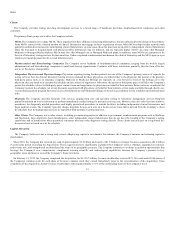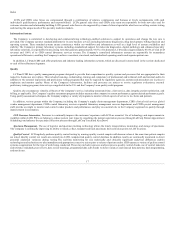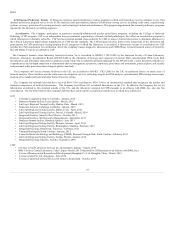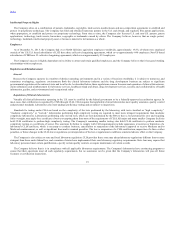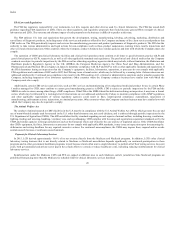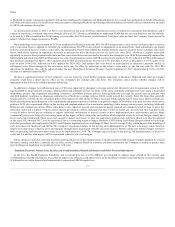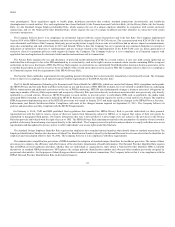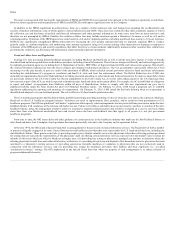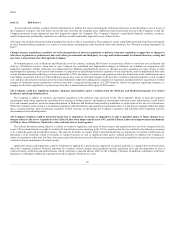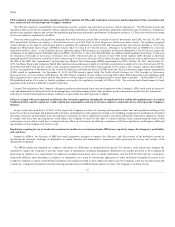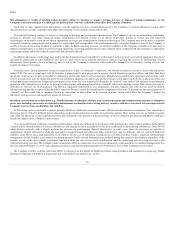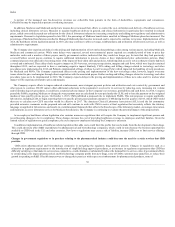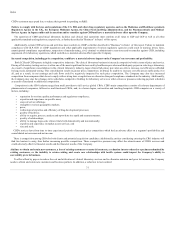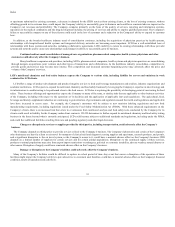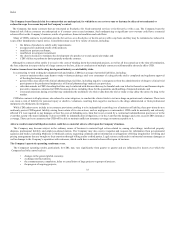LabCorp 2015 Annual Report Download - page 25
Download and view the complete annual report
Please find page 25 of the 2015 LabCorp annual report below. You can navigate through the pages in the report by either clicking on the pages listed below, or by using the keyword search tool below to find specific information within the annual report.
Index
There are a variety of other types of U.S. and state fraud and abuse laws, including laws prohibiting submission of false or fraudulent claims. The
Company seeks to conduct its business in compliance with all U.S. and state fraud and abuse laws. The Company is unable to predict how these laws will be
applied in the future, and no assurances can be given that its arrangements will not be subject to scrutiny under such laws. Sanctions for violations of these
laws may include exclusion from participation in Medicare, Medicaid and other U.S. or state healthcare programs, significant criminal and civil fines and
penalties, and loss of licensure. Any exclusion from participation in a U.S. healthcare program, or any loss of licensure, arising from any action by any U.S. or
state regulatory or enforcement authority, would likely have a material adverse effect on the Company's business. In addition, any significant criminal or civil
penalty resulting from such proceedings could have a material adverse effect on the Company's business.
The Company is subject to licensing and regulation under national, state and local laws and regulations relating to the protection of the environment, and
human health and safety and laws and regulations relating to the handling, transportation and disposal of medical specimens, infectious and hazardous waste
and radioactive materials. All Company laboratories are subject to applicable laws and regulations relating to biohazard disposal of all laboratory specimens
and the Company generally utilizes outside vendors for disposal of such specimens. In addition, the U.S. Occupational Safety and Health Administration
(OSHA) has established extensive requirements relating to workplace safety for healthcare employers, including clinical laboratories, whose workers may be
exposed to blood-borne pathogens such as HIV, HCV and the hepatitis B virus (HCB). These regulations, among other things, require work practice controls,
protective clothing and equipment, training, medical follow-up, vaccinations and other measures designed to minimize exposure to, and transmission of,
blood-borne pathogens. Other countries where the Company conducts business have similar laws concerning the environment and human health and safety
with which the Company must also comply.
In 2012, the OSHA Hazard Communication Standard was revised based on the adoption of the Globally Harmonized System (GHS) that provides criteria
for the classification of chemical hazards. Updated copies of Safety Data Sheets for chemical products used across the Company were obtained prior to the
effective date of June 1, 2015.
The Company seeks to comply with all relevant environmental and human health and safety laws and regulations. Failure to comply could subject the
Company to various administrative and/or other enforcement actions.
Drug testing for public sector employees is regulated by the U.S. Substance Abuse and Mental Health Services Administration (SAMHSA), which has
established detailed performance and quality standards that laboratories must meet to be approved to perform drug testing on employees of U.S. government
contractors and certain other entities. To the extent that the Company’s laboratories perform such testing, each must be certified as meeting SAMHSA
standards. The Company’s laboratories in Research Triangle Park, N.C; Raritan, N.J.; Houston, Texas; Southaven, Miss; and St. Paul, Minn are all SAMHSA
certified.
The use of controlled substances in testing for drugs of abuse is regulated by the U.S. Drug Enforcement Administration.
The Company maintains a comprehensive, company-wide compliance program and continuously evaluates and monitors its compliance with all
Medicare, Medicaid, FDA, and other rules and regulations in the U.S. and the other countries where the Company has operations. The objective of the
Company’s compliance program is to develop, implement and update compliance safeguards as necessary. Emphasis is placed on developing compliance
policies and guidelines, personnel training programs and various monitoring and audit procedures to achieve implementation and maintain compliance with
all applicable rules and regulations.
The Company seeks to conduct its business in compliance with all statutes, regulations, and other requirements applicable to its clinical laboratory
operations and drug development business. The clinical laboratory testing industry and drug development industries are, however, subject to extensive
regulation, and many of these statutes and regulations have not been interpreted by the courts. There can be no assurance that applicable statutes and
regulations will not be interpreted or applied by a prosecutorial, regulatory or judicial authority in a manner that would adversely affect the Company.
Potential sanctions for violation of these statutes and regulations include significant fines and the loss of various licenses, certificates, and authorizations,
which could have a material adverse effect on the Company’s business.
25


